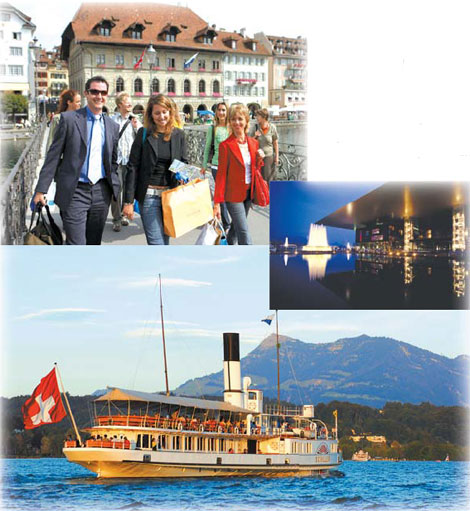Land of sweets, scenery and science
Precision and innovation in watch making, the sweet temptations of chocolate and breathtaking scenery have all brought renown to Switzerland.
History
Switzerland's geographical position with transit routes over the Alps made it a desirable possession for great European powers through the ages.
The nation developed slowly over many centuries, as more and more regions came together to form a loose confederation whose members gave each other mutual support. At times their different interests stretched the bonds between them almost to the breaking point.
It was only in 1848 that Switzerland became a more centralized federal state. This favored its economic development and ended any possibility that Switzerland might break apart.
Politics
Switzerland's existence as a modern federal state dates back to 1848. The government is composed of seven members elected by the Federal Assembly that take turns serving as president. Swiss citizens can influence political affairs through a highly developed system of direct democracy.
Switzerland's position as a neutral state allows it to play an important humanitarian role in world affairs and to act as a mediator between conflicting parties.
Economy
Switzerland's economy is based on a highly qualified labor force performing highly skilled work. Its major sectors include micro-technology, hi-tech, biotechnology and pharmaceuticals, as well as banking and insurance. The service sector now employs the greatest number of people.
Most workers in Switzerland are employed by small and medium-sized enterprises, which play an extremely important role in its economy.
The Swiss are concerned that economic activity should have as little impact as possible on the environment. Switzerland's energy and transport policies aim to be environmentally friendly.
The age of unlimited economic growth in Switzerland is over. Fear of unemployment has been one of the nation's main concerns for several years.
Culture
Switzerland has a thriving arts scene, with its architects in particular achieving worldwide acclaim.
Its culture is so diverse the Swiss themselves sometimes wonder what keeps the nation together.
Its wide range of traditional customs is one reflection of the diversity.
Geography
Switzerland's main geographical regions are the Jura Plateau and the Alps.
Its climate varies greatly from one region to another. Depending on the area and the time of year, Switzerland experiences conditions reminiscent both of Siberia and of the Mediterranean.
Towns have their own distinctive character preserved by a shortage of land for new buildings and regulations to preserve the appearance of towns and villages.
Environment
Its topography results in a central plateau that is densely populated. Industry, farming, transport and leisure activities compete for space with residential areas.
The mountain environment is especially fragile. Climate change is bringing the potential for landslides and flooding, as well as threatening the important tourism industry.
Science
Recognized as an international research center, both the Swiss state and the private sector are strongly involved in promoting science and technology.
Swiss scientists are involved in ground-breaking research, in part with foreign colleagues, in sciences ranging from nanotechnology to space research.
Its scientific success has a long history. Many Swiss and Swiss-based scientists have won Nobel prizes.
Education
Switzerland prides itself on its high standard of publicly funded education. As a country with few natural resources, its prosperity depends to a large extent on its brain power. Most people continue studying after the years of compulsory education and many take further courses throughout their lives. At the same time, the education system has to meet new challenges from changes in society and the world.
People
Switzerland has a population of about 7.4 million. Foreigners account for around 20 percent of the resident population. The average age is increasing as people live longer and have fewer children. Lifestyles are changing as the Swiss adapt to new demands.
Religious belief has declined in recent years, but the religious landscape has diversified.
Switzerland has four unevenly distributed languages and a wealth of dialects.
Leisure
The Swiss have a well-deserved reputation for being hard workers, but they enjoy their leisure as much as anyone else. Leisure activities range from taking part in grueling sports to relaxing with family and friends. Many people also devote part of their leisure time to public service.

(China Daily 08/01/2008 page21)














